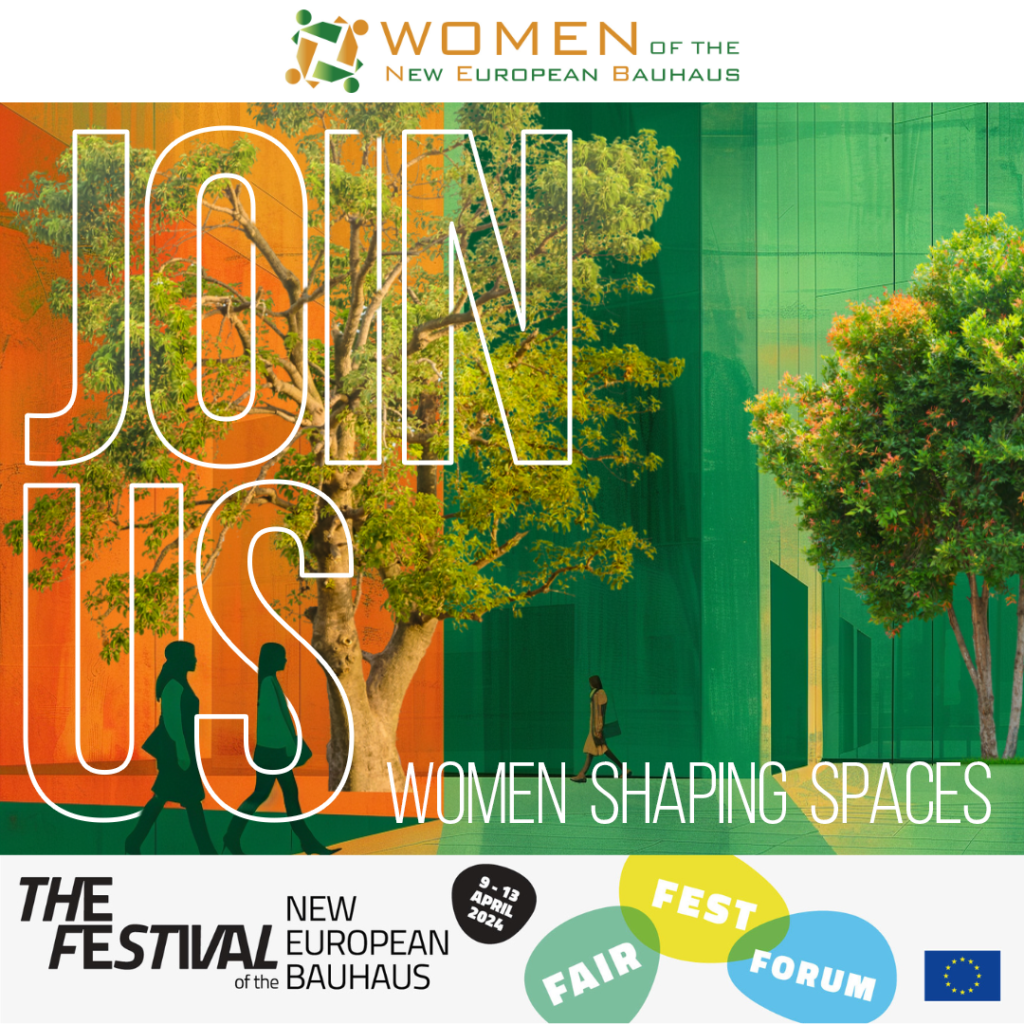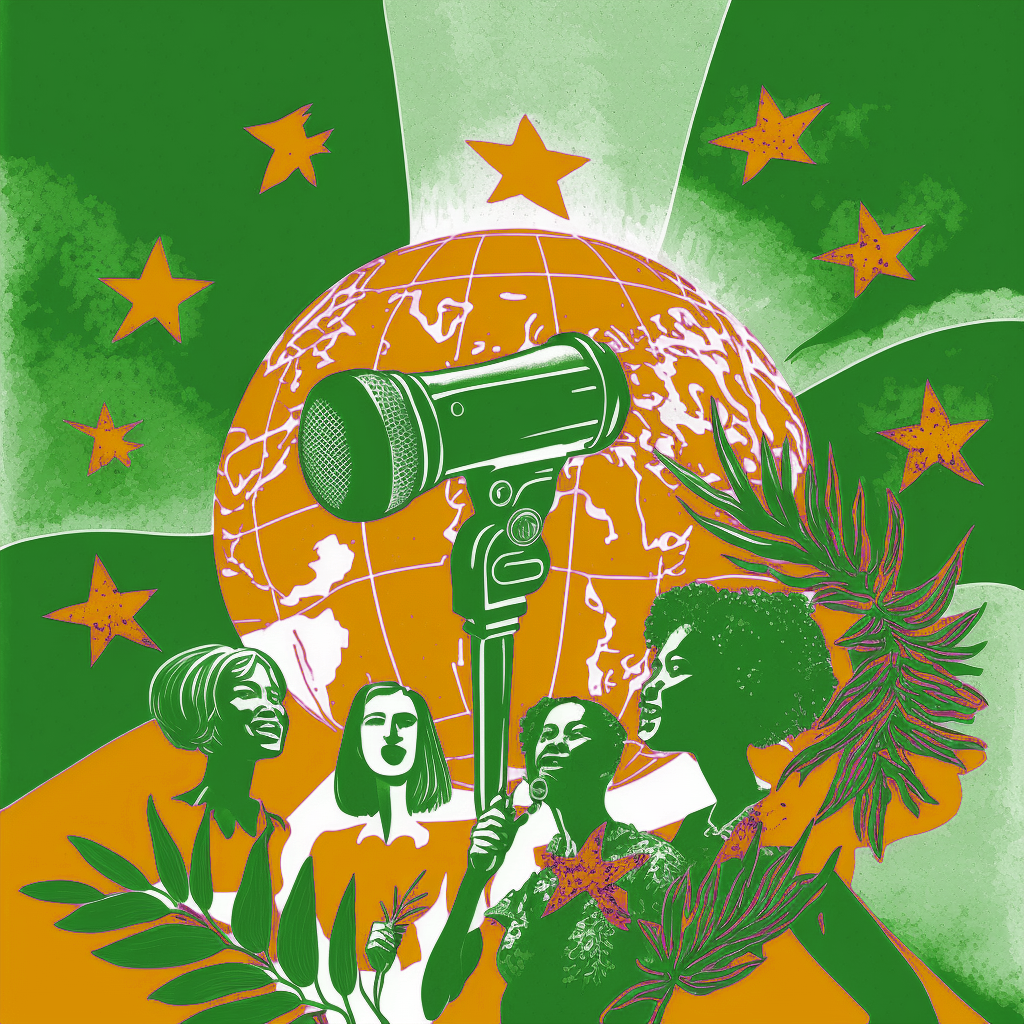Women Shaping Spaces
Women of the NEB: Redefining inclusivity , sustainability, and beauty in the built environment. Championing diverse women's voices, fostering collaboration, and shaping vibrant communities.
About Women of the NEB
Women of the NEB is an innovative initiative aligned with the New European Bauhaus values of Inclusive, Sustainable, and Beautiful and aimed at inspiring positive change. With a primary focus on advancing discussions around Gender Equality, this initiative strives to foster inclusivity and diversity, amplifying the voices of women across various backgrounds and fields from Europe and beyond. Encompassing those women shaping and co-creating spaces concerning the Built Environment, Architecture, Urbanism, Design and Creativity, and associated fields. Embracing the principles of intersectionality, Women of the NEB endeavors to create a comprehensive dialogue that resonates across diverse Cities and Communities.
Expanding its impact, Women of the NEB will reach into essential domains, including the intersection of the built environment, with a specific focus on public space, and creativity and cultural aspects with storytelling and finance, funding, and technology. Acknowledging the pivotal roles played by women in these sectors, the initiative is dedicated to amplifying their voices and contributions. By fostering meaningful discussions and collaborations, Women of the NEB aspires to harness the collective intelligence of women in these fields, driving positive change and promoting inclusivity and sustainability across Cities and Communities.
The initiative is rooted in a commitment to embracing diversity, fostering dialogue, and harnessing collective critical thinking. Its overarching goal is to co-create a future that not only upholds principles of inclusivity, sustainability, and beauty but also reflects the multifaceted tapestry of women’s contributions across various domains. Women of the NEB is more than a platform; it is a movement inviting active participation in championing Gender Equality and contributing to the shaping of a brighter, more equitable future for all.
In essence, Women of the NEB stands as a beacon, spotlighting the invaluable contributions of women in diverse fields while simultaneously addressing the challenges they face. Join us in the journey toward a future where the collective strength of women shapes the foundation for a more equitable and harmonious world!
Redefining Women of the NEB for the Women of the NEB - Women Shaping Spaces Exhibition - NEB Festival 2024
Women of the NEB has been successful in its application and been selected to participate at the New European Festival taking place between April 9th to 13th at the Art & History museum Brussels. Together with the EU presidency of Belgium. We are excited to co-curate the Exhibition bringing together many diverse actors across various fields of ‘Women Shaping Spaces.’ Together partners of the Women of the NEB will also hold a 60 minute workshop on April 12th at 14hrs.

Collaborations towards the NEB Lab Proposal 2023
Women of the NEB was launched with the presentations to the NEB community via the NEB Lab info sessions by Rozina Spinnoy of BIDs Belgium in 2022 and 2023. These info sessions attracted interest from various community partners and extended network. Together conducting brainstorming sessions and meeting online every fortnight with partners. Gathering momentum to collaborate towards an NEB Lab proposal.
Extended network of supporters and collaborators are:
Women of the NEB (New European Bauhaus) is an initiative started by BIDs Belgium, community partner of the European Commission initiative of the New European Bauhaus and Partners
To find out more about the New European Bauhaus please click here.
Women of the NEB, aligns with the New European Values of Inclusive, Sustainable and Beautiful and will initially focus on three specific project streams related to advancing the discussions around Gender Equality and highlighting related topics.
These projects streams are important topics to include a wide arrange of extended partners that take into account all women, including the intersectionality / diverse women who are active in a variety of fields from the Arts to Technology, Sciences and Policy Making. Including those in the Creative and Cultural Industries, as we use our collective critical thinking to understand better how we can co-design inclusive, sustainable and beautiful way of living in across our Cities and Communities.

What are our Women of the NEB Project Topic Streams and Why are These Topics Important to contribute to an 'Inclusive, Sustainable and Beautiful' Way of Living?

Women and Public Space
We need to ensure safe public spaces for women and girls in both the urban and rural communities and cities across Europe and beyond. With initiatives from UN Women, UN Habitat’s Her City programme to Empowering Women, Public Space and Climate Change, the topic of women and public space is important for several reasons. Here are some key points: – Safety: Women often face safety concerns when navigating public spaces. These concerns can be physical, such as harassment or assault, or psychological, such as the fear of harassment or assault. Addresing safety concerns is crucial for women’s ability to access and enjoy public spaces. – Access and participation: Women’s abiltiy to access and participate in public spaces can be limited by various factors, such as cultural norms, physical barriers, and discriminatory policies or practices. Ensuring that public spaces are accessible and inclusive is important for women’s ability to participate fully in social, cultural and economic life. – Representation: Women are often underrepresented in public spaces, such as in leadership positions or as decision- makers in urban planning and design. This can limit women’s ability to shape th espaces they inhabit and contribute to a lack of diversity in public life. – Health and well-being: Access to safe and inclusive public spaces is important for women’s physical and mental health and well-being. Public spaces can provide opportunities for physical activity, social interaction and relaxation., which are all important for maintaining good health. Overall, the topic of women and public space is important and gaining more traction. The topic conveys the issues of safety, access, participation, representation, health and well-being. As well as contributing to eco-feminist cities, with consideration to spatial, racial and social justice. Addressing these issues is crucial for creating more equitable, inclusive, sustainable and thriving communties.
Storytelling
Storytelling is important for Women at the NEB, to take global perspectives of the diverse women living across Europe. Firstly, storytelling allows individuals to share their experiences, perspectives and insights in a way that is accessible and engaging. By listening to stories from diverse women in Europe, we can gain a deeper understanding of their unique cultural and social contexts, as well as the challenges and opportunities they face. Secondly, storytelling can help to challenge stereotypes and prejudices about diverse women in Europe. By sharing their stories, women can break down the barriers and misconceptions that have been perpetuated by dominant narratives in society. Thirdly, storytelling can serve as a powerful tool for building empathy and connection across diverse communities. By hearing stories from women who come from different backgrounds and experiences, we can cultivate a greater understanding and compassion for one another. Overall, storytelling places a crucial role in taking a global perspective of diverse women in Europe. Through storytelling, we can amplify diverse voices, challenge steriotypes, and build empathy and understanding across cultures and communities. We plan to work, share and exchange with our extended network of partners.
Financing
The statistics on funding for women-led initiatives in Europe show that there is a significant gender gap in access to funding, particularly in the startup and entrepreneurship sectors. Women of the NEB wishes to encourage the dialogue and awareness around this topic, with our extended network. Here are some key statistics: – In 2019, only 2.8% of venture capital funding in Europe went to female-led startups compared to 97.2% that went to male-led startups. (Atomica, 2019) – Women-led startups in Europe receive an average €4.8 million in fuding, while male-led startups receive an average of €6million. (Sifted 2021). – Only 16% of angel investors in Europe are women. (European Women in VC, 2019) These above mentioned statistics are important because funding is crucial for the success of startups and entrepreneurship initiatives. Without access to funding, women-led initiatives may struggle to get off the ground or grow to their full potential. The gender gap in fundingcan also perpetuate gender inequalities in the business qorld and limit the diversity of ideas and perspectives that are represented in the marketplace. Moreover, funding is not just important for individual women-led initiatives but also for the braoder economy. Women-led initiatives can create jobs, stimulate innovation and contribute to economic growth. Therefore, addressig the gender gap in funding is not only a matter of fairness and equality, but also has braoder economic implications.
The New European Bauhaus Community and extended network of partners, can play a vital role in advancing women's empowerment and gender equality.
Women and Public Space - Call to Action
We call upon the New European Bauhaus Community partners, the European Commission and City leaders to prioritize initiatives that promote gender equality in public spaces. This can include increasing the visibility of women in public life, creating safe and inclusive spaces for women and girls, and promoting women’s leadership in urban planning and design. By promoting gender equality in the public sphere, we an create more equitable and sustainable communities for all. Let us work together to ensure that women have equal access to public spaces and are empowered to shape the public sphere in meaningful ways. Together we can build a more inclusive, equitable, sustainable future for all.
Women and Storytelling - Call to Action
We call upon the New European Bauhaus community partners, the European Commission and extended community to prioritize the voices and stories of all women, particularly those that highlight the role of migration in building an inclusive Europe and those that are vulnerable in our society. By amplifying these stories, we can create a more inclusive narrative of Europe that celebrates diversity and promotes inclusion and social cohesion. Let us work together to ensure that all women’s voices are heard and their stories are told, particularly those that have been historically marginalized and those that have faced discrimination. Together, we can build a more inclusive, sustainable and equitable future for all, one that embraces our shared heritage of migration and diversity.
Women and Financing - Call to Action
We call upon the New European Bauhaus community partners, the European Commission and extended community to prioritize women and financing as an important topic for gender equality. Financial empowerment plays a crucial role in advancing gender equality, as it enables women to have greater control over their economic lives, fosters entrepreneurship and innovation, and promotes social and economic progress. Historically, women have faced significant barriers in accessing financial resources, ranging from limited access to capital and credit to discriminatory lending practices. These barriers disproportionately affect women from minority backgrounds, those that are have physical or psycho-social disabilities, further exacerbating the existing gender, racial, discriminatory, inequalities in our society. Let’s together address these disparities and promote financial inclusivity, where we can create a more equitable, sustainable and just society for all.









